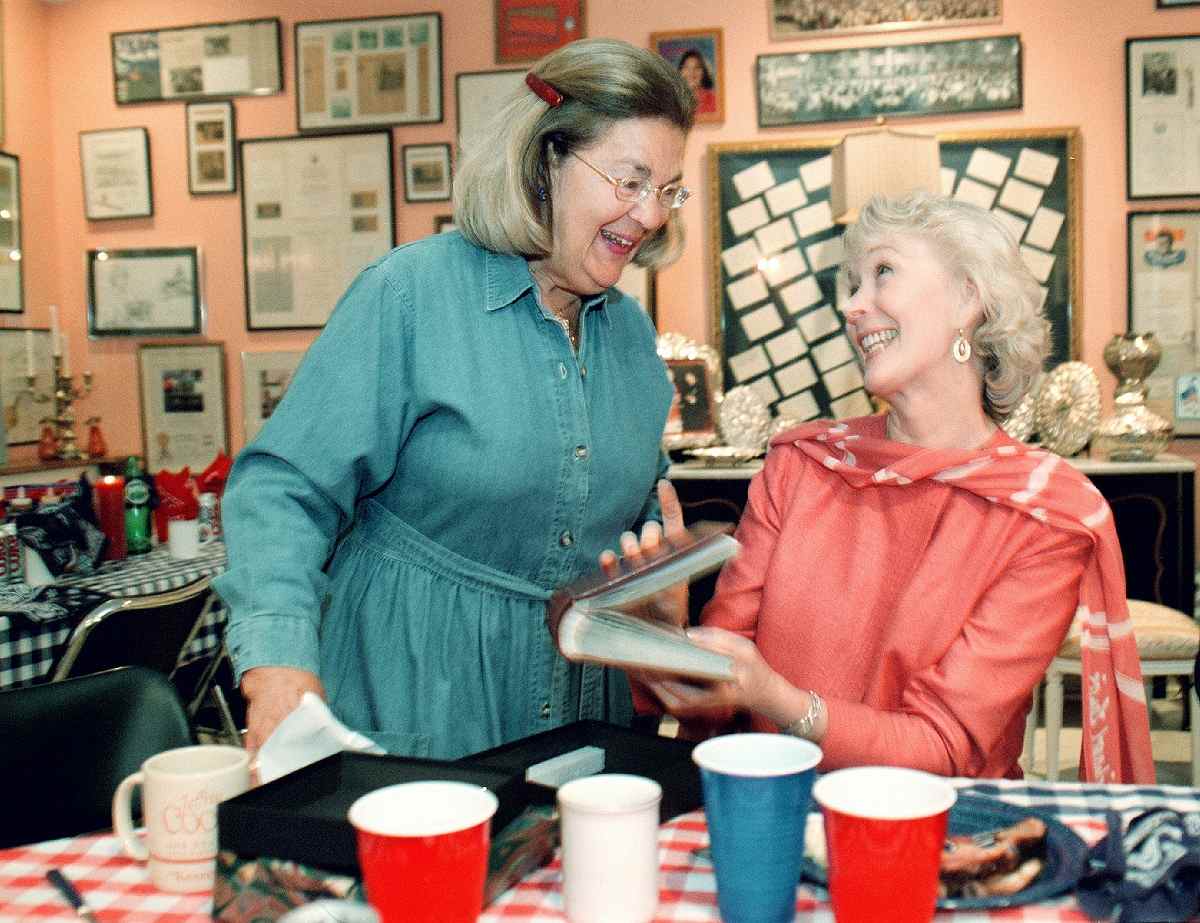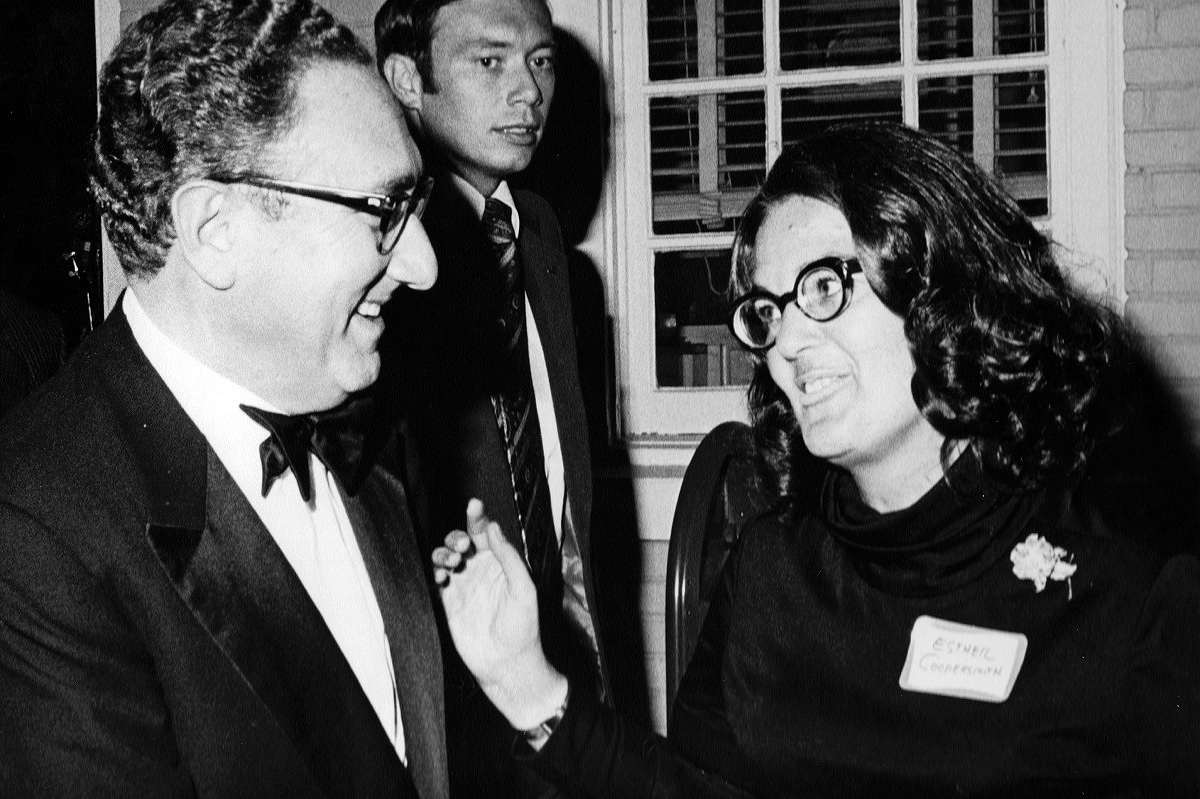
At her Washington home in 2002, Esther Coopersmith, left, presents a gift to Bernadette O’Huiginn, wife of the Irish ambassador to the United States.
15:22 JST, March 29, 2024
Esther Coopersmith, who nurtured generations of Democratic politicians – among them a young Joe Biden – and conducted diplomacy at the dinner table as one of Washington’s longest-reigning social doyennes, died March 26 at her home in the District. She was 94.
The cause was cancer, said her son Jonathan Coopersmith.
Coopersmith, the daughter of Jewish immigrants from Eastern Europe, grew up in small-town Wisconsin and came to Washington in the early 1950s after being drawn in to politics as a member of the Young Democrats.
She idolized Eleanor Roosevelt, the former first lady who had also served as a delegate to the United Nations, and harbored aspirations of running for Congress. But after marrying a successful real estate developer and starting a family, Coopersmith found another seat at the table of power as a fundraiser, philanthropist, diplomat (official and unofficial) and hostess in the tradition of Perle Mesta and Pamela Harriman.
Over the decades – from her stint organizing coast-to-coast barbecues for Lyndon B. Johnson’s 1964 White House campaign to a private fundraiser at her home in October headlined by President Biden – Coopersmith helped raise millions of dollars for Democratic candidates.
In a statement after her death, Biden recalled that she was one of his “early boosters” when he was a 29-year-old first-time candidate for the Senate in 1972 and remarked that “her belief in me meant the world.”
Coopersmith’s interests extended from domestic politics to international affairs, and Biden described her in his statement as “a skilled diplomat, committed advocate, and genuine bridge-builder” who “energetically strengthened international organizations dedicated to human equality.”
In 1979 and 1980, during the administration of President Jimmy Carter, Coopersmith served as a public member of the U.S. delegation to the United Nations. His successor, Ronald Reagan, sent her as a representative to the U.N. Commission on the Status of Women and to a 1985 conference in Nairobi marking the U.N. Decade for Women. Under President Bill Clinton, she served as a U.S. observer at UNESCO and later, in 2009, was named a UNESCO goodwill ambassador.
But Coopersmith’s influence was a testament to a fact of life in Washington, which is that titles are not necessarily a prerequisite for power. For decades, whether she held an official rank at the time or none, Coopersmith was in effect a member of the diplomatic service, her home a ritual stop for envoys newly arrived in Washington.
She lived for many years in the suburb of Potomac, Md., before moving in the 1990s to a mansion in the Kalorama neighborhood of Washington near Embassy Row.
“Foreign ambassadors to the U.S. meet the president in the Oval Office. The State Department is open to them, and members of Congress are eager to greet them,” a reporter for the Washington Times wrote in 2013. “But the diplomats, with the exalted titles of ‘excellency and plenipotentiary,’ do not really learn the ways of Washington until they have dinner with Esther Coopersmith.”
Anatoly F. Dobrynin, the longtime Soviet ambassador, had lived in the United States for 24 years before he experienced a Thanksgiving meal – for the first time – at her table, Coopersmith said.
At her brunches, luncheons and soirees, which numbered in the dozens annually, she delighted in making seating arrangements that held the promise of advancing, if only infinitesimally, the cause of world peace.
“People need a place out of the public spotlight to meet and talk,” she told the New York Times in 1987. “I like to make it possible for people to meet each other.”
She took credit for introducing Jehan Sadat and Aliza Begin, the wives, respectively, of Egyptian President Anwar Sadat and Israeli Prime Minister Menachem Begin, signatories of the Camp David Accords brokered by Carter. Biden credited Coopersmith with helping facilitate the accords, and with “working to foster dialogue and understanding between people of different cultures and faiths, especially in the Middle East.”
One of the benefits of Coopersmith’s unofficial diplomacy was that she was not bound by protocol.

Esther Coopersmith with national security adviser Henry Kissinger at a fundraiser in 1973 in Washington.
“It’s my home, and I can do whatever I want,” she told the Jerusalem Post in 1993, explaining her decision to seat an Israeli diplomat next to an emissary of Iraqi leader Saddam Hussein at a barbecue she hosted shortly before Iraq invaded Kuwait in 1990. “Besides, it didn’t hurt them at all. They didn’t talk much, but as far as I was concerned, it was a start.”
Coopersmith organized trips to the Soviet Union, the Middle East, Asia and Africa for the spouses of senators and Cabinet officials and was widely credited with cultivating the cross-cultural understanding that is the intangible basis of diplomacy. She received a U.N. peace medal in 1984.
“Esther Coopersmith dedicated her life to the role of ‘citizen diplomat,’ bringing people together in service of higher causes,” former first lady, senator and secretary of state Hillary Clinton wrote in a tribute posted on the social media platform X. “Solutions to global problems started over conversations at her barbecues and buffets.”
Esther Lipsen was born in Des Moines on Jan. 18, 1930, and grew up in Mazomanie, Wis., roughly 30 miles west of Madison. Her father, from Belarus, was a cattle dealer, and her mother, who was Romanian, raised the couple’s five children.
Although her immigrant family had few if any political connections, Coopersmith displayed an almost innate understanding of how power works.
“To be in politics you had to have money or you had to know how to raise it,” she told the Times in 1978. “I started when I was 12, raising money for the Red Cross.”
After graduating from high school, Coopersmith studied at the University of Denver and later at the University of Wisconsin, where she joined the Young Democrats and worked for Sen. Estes Kefauver (D-Tenn.) on his unsuccessful bid for the 1952 presidential nomination.
She did not receive a college degree, her son said, explaining that “the need to support her family caused her to leave the University of Denver, and the allure of politics preempted her finishing up at Wisconsin.”
On Kefauver’s suggestion, she moved to Washington and found work initially as a lobbyist. She and her future husband, Jack Coopersmith, met at a dance hosted by Adas Israel synagogue and were married in 1954.
Jack Coopersmith died in 1991. Survivors include four children, Jonathan Coopersmith, Connie Coopersmith, Jeffrey Coopersmith and Ronald Coopersmith; a sister; and eight grandchildren.
Although Coopersmith primarily supported Democratic candidates, she extended her hospitality across the political aisle. The only president since Harry S. Truman she had not met was Donald Trump.
“He goes his way, and I go mine,” Coopersmith told the Washington Diplomat in 2022.
In addition to her political work, she was a founder of what is now the National Children’s Museum in Washington.
“I do it because I love the activity, the excitement, I love to mix people up, I love sharing my home,” Coopersmith told the Times, explaining why she had chosen the life she did. “In New York if you have a lot of money you can buy your way into anything. Here it is power that counts.”
Top Articles in News Services
-

Survey Shows False Election Info Perceived as True
-

Hong Kong Ex-Publisher Jimmy Lai’s Sentence Raises International Outcry as China Defends It
-

Japan’s Nikkei Stock Average Touches 58,000 as Yen, Jgbs Rally on Election Fallout (UPDATE 1)
-

Japan’s Nikkei Stock Average Falls as US-Iran Tensions Unsettle Investors (UPDATE 1)
-

Trump Names Former Federal Reserve Governor Warsh as the Next Fed Chair, Replacing Powell
JN ACCESS RANKING
-

Producer Behind Pop Group XG Arrested for Cocaine Possession
-

Japan PM Takaichi’s Cabinet Resigns en Masse
-

Man Infected with Measles Reportedly Dined at Restaurant in Tokyo Station
-

Israeli Ambassador to Japan Speaks about Japan’s Role in the Reconstruction of Gaza
-

Videos Plagiarized, Reposted with False Subtitles Claiming ‘Ryukyu Belongs to China’; Anti-China False Information Also Posted in Japan

























